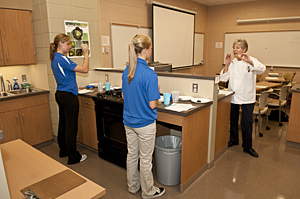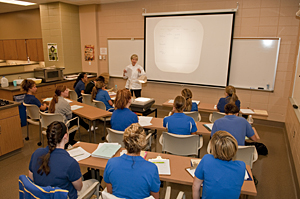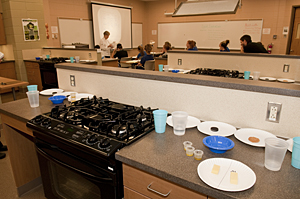
ADVERTISEMENT
- Rozovsky wins prestigious NSF Early Career Award
- UD students meet alumni, experience 'closing bell' at NYSE
- Newark Police seek assistance in identifying suspects in robbery
- Rivlin says bipartisan budget action, stronger budget rules key to reversing debt
- Stink bugs shouldn't pose problem until late summer
- Gao to honor Placido Domingo in Washington performance
- Adopt-A-Highway project keeps Lewes road clean
- WVUD's Radiothon fundraiser runs April 1-10
- W.D. Snodgrass Symposium to honor Pulitzer winner
- New guide helps cancer patients manage symptoms
- UD in the News, March 25, 2011
- For the Record, March 25, 2011
- Public opinion expert discusses world views of U.S. in Global Agenda series
- Congressional delegation, dean laud Center for Community Research and Service program
- Center for Political Communication sets symposium on politics, entertainment
- Students work to raise funds, awareness of domestic violence
- Equestrian team wins regional championship in Western riding
- Markell, Harker stress importance of agriculture to Delaware's economy
- Carol A. Ammon MBA Case Competition winners announced
- Prof presents blood-clotting studies at Gordon Research Conference
- Sexual Assault Awareness Month events, programs announced
- Stay connected with Sea Grant, CEOE e-newsletter
- A message to UD regarding the tragedy in Japan
- More News >>
- March 31-May 14: REP stages Neil Simon's 'The Good Doctor'
- April 2: Newark plans annual 'wine and dine'
- April 5: Expert perspective on U.S. health care
- April 5: Comedian Ace Guillen to visit Scrounge
- April 6, May 4: School of Nursing sponsors research lecture series
- April 6-May 4: Confucius Institute presents Chinese Film Series on Wednesdays
- April 6: IPCC's Pachauri to discuss sustainable development in DENIN Dialogue Series
- April 7: 'WVUDstock' radiothon concert announced
- April 8: English Language Institute presents 'Arts in Translation'
- April 9: Green and Healthy Living Expo planned at The Bob
- April 9: Center for Political Communication to host Onion editor
- April 10: Alumni Easter Egg-stravaganza planned
- April 11: CDS session to focus on visual assistive technologies
- April 12: T.J. Stiles to speak at UDLA annual dinner
- April 15, 16: Annual UD push lawnmower tune-up scheduled
- April 15, 16: Master Players series presents iMusic 4, China Magpie
- April 15, 16: Delaware Symphony, UD chorus to perform Mahler work
- April 18: Former NFL Coach Bill Cowher featured in UD Speaks
- April 21-24: Sesame Street Live brings Elmo and friends to The Bob
- April 30: Save the date for Ag Day 2011 at UD
- April 30: Symposium to consider 'Frontiers at the Chemistry-Biology Interface'
- April 30-May 1: Relay for Life set at Delaware Field House
- May 4: Delaware Membrane Protein Symposium announced
- May 5: Northwestern University's Leon Keer to deliver Kerr lecture
- May 7: Women's volleyball team to host second annual Spring Fling
- Through May 3: SPPA announces speakers for 10th annual lecture series
- Through May 4: Global Agenda sees U.S. through others' eyes; World Bank president to speak
- Through May 4: 'Research on Race, Ethnicity, Culture' topic of series
- Through May 9: Black American Studies announces lecture series
- Through May 11: 'Challenges in Jewish Culture' lecture series announced
- Through May 11: Area Studies research featured in speaker series
- Through June 5: 'Andy Warhol: Behind the Camera' on view in Old College Gallery
- Through July 15: 'Bodyscapes' on view at Mechanical Hall Gallery
- More What's Happening >>
- UD calendar >>
- Middle States evaluation team on campus April 5
- Phipps named HR Liaison of the Quarter
- Senior wins iPad for participating in assessment study
- April 19: Procurement Services schedules information sessions
- UD Bookstore announces spring break hours
- HealthyU Wellness Program encourages employees to 'Step into Spring'
- April 8-29: Faculty roundtable series considers student engagement
- GRE is changing; learn more at April 15 info session
- April 30: UD Evening with Blue Rocks set for employees
- Morris Library to be open 24/7 during final exams
- More Campus FYI >>
2:07 p.m., Sept. 22, 2010----Students in Carolyn Manning's Food Concepts class, NTDT 201, are selecting, preparing, and tasting food in a new state-of-the-art laboratory on the University of Delaware campus. A year-long planning and construction project culminated in completion of the classroom, located in the Willard Hall Education Building, just in time for the fall 2010 semester.
The facility features six work stations -- including one that is ADA-accessible -- each with a gas stove, a deep stainless-steel sink, and easy-to-clean cabinets and countertops. A large mirror over an additional countertop with a gas cooktop enables the entire class to view demonstrations, and a transparency projector allows students to record data and share it with the class. Wheeled tables can be easily moved around the room as needed for demonstrations and displays.
A large area adjacent to the kitchen workstations provides desk space for classroom work and lectures, and the adjoining pantry houses baking pans, dishes, measuring cups, skillets, colanders, and other kitchenware on open stainless shelves.
A food science class for nutrition majors, the course focuses on the composition and structure of foods, the functions of ingredients, and the methods used to achieve desirable sensory and nutritional attributes in foods.
During a recent class, students sampled olive oil and evaluated it for look, smell, taste, and feel. Slices of green apple were provided for the tasters to cleanse their palates.
“There are two things you can't say in here,” Manning told the class as they swirled the oil around in their mouths.
“I don't want to hear 'I like it' or 'I don't like it.' I want you to be like restaurant reviewers and use descriptors.” Acceptable terms for the olive oil ranged from fruity and fragrant to peppery and pungent.
In other taste tests, the students evaluated foods ranging from cheese and jelly beans to Oreos and oatmeal cookies. In future classes, they will use the facility to learn proper measuring techniques and understand the science behind making cheese, creating sauces, cooking fruits and vegetables, and baking muffins and cakes.
Manning, associate professor in the Department of Behavioral Health and Nutrition, envisions potential uses for the facility beyond its function as a lab for her class, including culinary demonstrations by faculty, staff, and students involved in UD's Food and Culinary Club and its HealthyU Employee Wellness Program.
Article by Diane Kukich
Photos by Doug Baker




